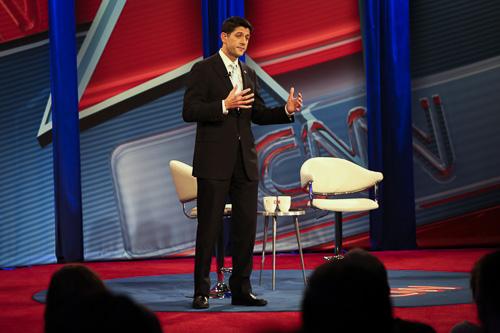
House Speaker Paul Ryan spoke about topics like health care, immigration and trade deals to a full audience at Jack Morton Auditorium and to viewers across the country during a CNN town hall Thursday evening.
Ryan, who was targeted throughout the past election cycle by President-elect Donald Trump, talked at the event about Trump’s priorities and how he and other Republican leaders were already working with the incoming presidential administration to get projects rolling before inauguration.
Jake Tapper, the chief Washington correspondent at CNN, led the discussion with Ryan who answered questions from the audience.
Missed the broadcast? Here are some of the biggest takeaways:
1. Health care, health care, health care
The first third of the town hall featured questions about health care, which were particularly relevant as the House of Representatives had voted to begin dismantling the Affordable Care Act, commonly known as Obamacare, the night before.
Jeff Jeans, a cancer survivor from Sedona, Az. who said he would have died without assistance from the health care law, asked Ryan why he and other Republicans wanted to repeal the law without offering a replacement.
Ryan said the process of repealing the law would happen at the same time that lawmakers introduced a new health care law that would provide citizens with tax credits to purchase plans.
“The law is collapsing and so we’ve got to rescue people,” he said, citing rising premiums in states like Jean’s home state of Arizona and Texas.
Shannon Doe, a GW student, asked Ryan about the impact of defunding Planned Parenthood, which Republicans have threatened to do over the years, and how they would replace the services that women use at the centers.
Ryan said he would instead support instituting federal community health centers because Planned Parenthood is too controversial for performing abortions, even after Tapper pointed out that tax dollars don’t fund abortions.
“We don’t want to effectively give taxpayer money to an organization providing abortions,” Ryan said, claiming that even though the dollars wouldn’t go directly to abortions, the funds could impact the services indirectly.
2. Two sides of immigration
Mary Anne Mendoza, who lost her son in a head-on collision with an undocumented man who was found to be using drugs at the time, asked Ryan how he would work to deport undocumented criminals and build the wall between the U.S. and Mexico that Trump famously campaigned on.
Ryan said he and others are already working with Trump’s team on those projects and condemned sanctuary cities, cities where leaders have promised to assist and protect undocumented residents. D.C. is a sanctuary city.
“Sanctuary cities are a violation of the rule of law, and they are not to be tolerated,” he said. “That means if you want federal assistance, you’re not going to get it. You’ve got to enforce the law.”
Angelic Villalobos, an undocumented immigrant who moved to the U.S. as a child and is currently protected from deportation by a law designed to protect undocumented residents who came to the U.S. as children, asked Ryan if he wanted to deport immigrants like her.
Ryan said that as he and others worked on immigration laws, they would protect those currently shielded by the program, Deferred Action for Childhood Arrivals, but did not provide specifics on how they would do so.
“What we have to do is figure out how to have a humane solution to this very legitimate, sincere problem and respect the rule of law,” he said.
3. Tweeter-in-chief
The final question from the audience came from Christine Ford, a GW student who asked how Trump’s tweeting habits could impact his policies and the U.S.’s reputation internationally.
Ryan said that Trump’s use of Twitter was “extremely effective for getting elected president” and that while he does expect Trump to continue to use the platform, he thinks the president will become more restrained.
“I am just marveled and amazed how well he connected with so many people,” Ryan said. “I think he has a very special, personal relationship with individuals and he connects directly with them.”






